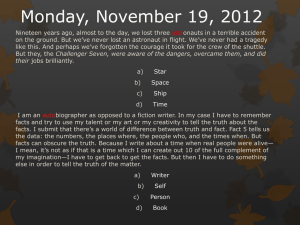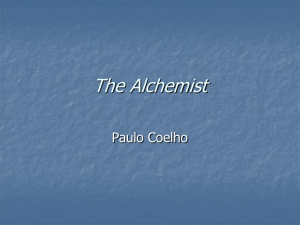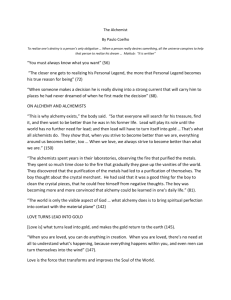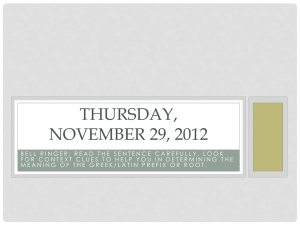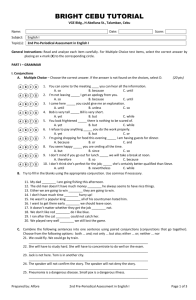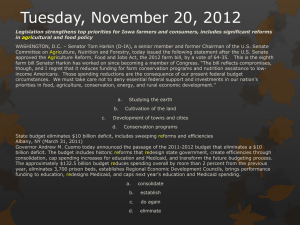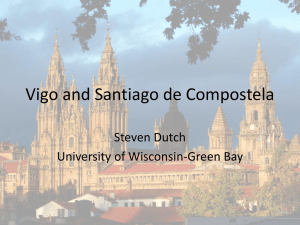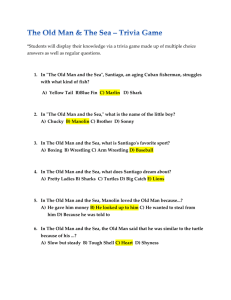Book Report
advertisement
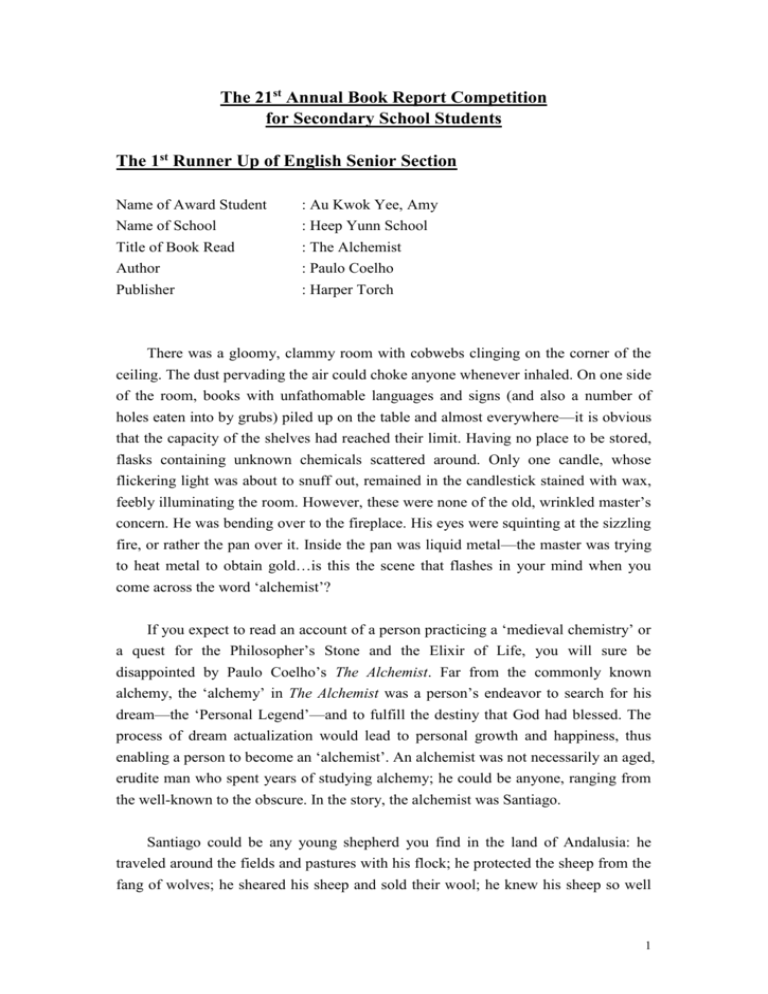
The 21st Annual Book Report Competition for Secondary School Students The 1st Runner Up of English Senior Section Name of Award Student Name of School Title of Book Read Author Publisher : Au Kwok Yee, Amy : Heep Yunn School : The Alchemist : Paulo Coelho : Harper Torch There was a gloomy, clammy room with cobwebs clinging on the corner of the ceiling. The dust pervading the air could choke anyone whenever inhaled. On one side of the room, books with unfathomable languages and signs (and also a number of holes eaten into by grubs) piled up on the table and almost everywhere—it is obvious that the capacity of the shelves had reached their limit. Having no place to be stored, flasks containing unknown chemicals scattered around. Only one candle, whose flickering light was about to snuff out, remained in the candlestick stained with wax, feebly illuminating the room. However, these were none of the old, wrinkled master’s concern. He was bending over to the fireplace. His eyes were squinting at the sizzling fire, or rather the pan over it. Inside the pan was liquid metal—the master was trying to heat metal to obtain gold…is this the scene that flashes in your mind when you come across the word ‘alchemist’? If you expect to read an account of a person practicing a ‘medieval chemistry’ or a quest for the Philosopher’s Stone and the Elixir of Life, you will sure be disappointed by Paulo Coelho’s The Alchemist. Far from the commonly known alchemy, the ‘alchemy’ in The Alchemist was a person’s endeavor to search for his dream—the ‘Personal Legend’—and to fulfill the destiny that God had blessed. The process of dream actualization would lead to personal growth and happiness, thus enabling a person to become an ‘alchemist’. An alchemist was not necessarily an aged, erudite man who spent years of studying alchemy; he could be anyone, ranging from the well-known to the obscure. In the story, the alchemist was Santiago. Santiago could be any young shepherd you find in the land of Andalusia: he traveled around the fields and pastures with his flock; he protected the sheep from the fang of wolves; he sheared his sheep and sold their wool; he knew his sheep so well 1 that he could understand the animal’s language. Just as everything was in smooth waters, Santiago’s tranquil and carefree life was wimpled by a dream about a hidden treasure near the pyramids in Egypt. To most people, a dream of buried treasures would be simply a dream—that was beyond all possibilities. Santiago, like others, was oblivious to the implication of the dream. Not until a mysterious old man in disguise urged him to pursuit his dream did Santiago make up his mind to set off to Egypt. In his journey, Santiago witnessed the greatness of the world, and met intriguing people, such as the crystal merchant, an Englishman and an alchemist. Experiences with these people are in fact stepping stones leading a step closer to his treasure. Santiago worked for a crystal merchant, acquiring not only business and language skills, but also money for traveling. On his way he encountered an Englishman, who introduced him to alchemy and inspired him to go on with his search. When Santiago was left stranded in the oasis due to tribal wars, he met an alchemist. The alchemist instilled the true wisdom of alchemy in Santiago and accompanied him in the final stages of his odyssey. However, the trip was no plain sailing at all; Santiago was robbed thrice, and was also in danger when tribal wars broke out in the desert. These misfortunes were not obstacles, but again, signposts of his journey. The story ended with Santiago finally discovered his treasure—not in Egypt, but in the place his was least expected. Colorful and captivating the story as it is, The Alchemist’s plot is actually a simple-profound fable filled with metaphors and allegories. The spoils of a conquest uncovered by Santiago represented not the physical wealth obtained, but the wisdom acquired through a journey of self-discovery and dream realization. The real treasure lay in the journey itself. The desert that Santiago traversed before reaching the pyramids symbolized obstacles encountered during the course of attaining dreams. Santiago was tempted to go astray from his goal in times of uncertainty; he almost gave in when he was caught by some soldiers. However, it was these hurdles that made him ruminate on inconspicuous omens, rediscover the direction he should follow, listen to his heart, and finally, reach the ‘Soul of the World’—God. Santiago’s happenings in the desert could even be an allusion to Jesus Christ’s forty days in the desert. Jesus was tempted by Satan, but his prayer and contemplation kept him in the right track. After spending days and nights in the desert, Jesus was more prepared to face future oppression. Santiago’s and Jesus’s experience in the desert both resulted in the reinforcement of determination and better preparation for the tests that would put to them. As the story is not to be taken literally, the wonderful 2 thing about it is that readers can have varied interpretations; thus how the story inspires them will also be differentiated personally. At first glance, The Alchemist seems to be a book with spiritual or religious context. This is due to that fact that the book is loaded with words like ‘Hand the Writes All’, ‘The Soul of the World’, ‘God’ and so on. However, I personally think that the beliefs behind the story are somewhat similar to those of the New Age. For example, when describing how Santiago ‘turned himself into wind’, it went, “The boy reached through the Soul of the World, and saw that it was part of the Soul of God. And he saw that the Soul of God was his own soul. And that he, a boy, could perform miracles.” This reminds me of the concept of divinity of the individual held by New Agers—that we are all Gods and we should seek God within the self and throughout the entire universe. Besides, the stress on following the omens and signs is parallel to the New Age idea that there are no coincidences and everything around us has a spiritual meaning, a spiritual lesson to teach us. Nonetheless, readers without New Age belief will also be imparted innumerable jewels of insights, which incite readers to follow their dreams, listen to their hearts and live up to their own destiny. Such thought is a positive impetus to strive for a contented and meaningful life. Being the number one bestseller in twenty-one countries, the secret to The Alchemist’s success is that Santiago’s story strikes the cord of people’s hearts. Santiago and we both have secret wishes referred to as Personal Legend, or the ‘path that God has chosen for you on Earth’. However, we were too timid to respond to the calling of God. We, like Santiago, faces obstacles while pursuing our destinies which whittle away our courage to confront our dreams. Two major obstacles are: the deprival of dreams by others and the fear of failure. “Everyone, when they are young, knows what their destiny is. At that point in their lives, everything is clear and everything is possible. They are not afraid to dream, and to yearn for everything they would like to see happen to them in their lives. But, as time passes, a mysterious force begins to convince them that it will be impossible for them to realize their destiny.” (P. 23) Human beings are born to be bold dreamers. Recall what your childhood dream was—to be come an artist, a musician, an inventor, or an astronaut? We all aspire to greatness, yet from childhood onward, we were told that our dreams were impossible to achieve. As others keep discouraging us, convincing us that we are not clever enough, there is not enough money, our effort does not worth the risk, and we lost self-confidence and buried our dreams deep in our 3 hearts. Still, the book urges us to unlock our wishes since “to realize one’s Personal Legend is a person’s only real obligation.” (P. 24) “Every search ends with the victor being severely tested.” (P. 134) We are sometimes deterred from searching for our dreams simply because we are afraid of failure. While we are pursuing goals, one thing is indubitable: we will encounter sufferings and setbacks. But success is just about falling a hundred times and getting up a hundred and one times; fallings are necessary as getting ups steel ourselves for future difficulties. In fact, “no heart has ever suffered when it goes in search of its dreams, because every second of the search is a second’s encounter with God and eternity” (P. 131). Once we have overcome the defeats, we feel confident and euphoric, knowing that we have proved to be worthy of the miracles of life. We start to live enthusiastically—and eventually fulfill our destiny blessed by God. “When you want something, all the universe conspires in helping you to achieve it.” is a powerful notion of The Alchemist which echoes all through the story. It is repeated several times in the book when Santiago was helpless and hopeless. We are not alone in the quest for our dreams—there are always someone to lend a hand and signs to guide us through. Just take a look around you and you will notice how enormous the force that backs you up is. All is ready except an east wind—there is no reason not to search for your dream. While some may argue that such optimism displayed in the novel sounds like an oversimplified version of New Age philosophy, isn’t the greatest wisdom usually lies in simplicity? As a matter of fact, it is the simple idea of ‘everything is possible if you want it to happen’ that initiate us to revive our hidden dreams. Just as Coelho states, “simple things are the most valuable and only wise people appreciate them”. The story of Santiago may appeal to everybody, especially teenagers, as we can all identify ourselves with him. Santiago, like any youngsters, was a boy who followed his heart rather than his head. His thirst for knowledge as well as his desire to explore the world led him chose to be a shepherd. Such adventurous nature can easily be found in young people. While Santiago settled down to a life of conformity as a shepherd, he suddenly had a dream of a treasure near the pyramids. The young, too, may have a sudden impulse to achieve something extraordinary. But what should the young do to embody their wild wishes? Like any good fable, the story depicts a journey to find one’s Personal Legend metaphorically instead of giving a step-by-step guide about how to do so. This leaves room for readers to ponder on their own life and destiny. 4 Nowadays, Many youngsters bury their dreams so deeply that their dreams are about to vanish. The ‘moral values’ of the society teach them to be practical about their dreams. In a world which emphasizes money talks, youngsters aspire to have enough money to burn. Therefore, their imagination and creativity will be strangled; they will end up living in void. If you find your life unfulfilling, reading The Alchemist will let you dive into the inmost, authentic part of the soul, where your Personal Legend is sealed. The ticket to such wonderful self-exploration is only a few hours of reading—it is just a flipping of 167 pages! What’s more, there are no dazzling vocabularies to baffle you; the simplicity of the language speaks directly to your heart. The reading experience will no doubt be marvelous. Santiago’s story has assured you that any dream will come true—the key to happiness, fulfillment and the ultimate purpose of creation is in your hand. Whether you will make ‘gold’ and become the next ‘alchemist’ depends on your willingness to give up your secure life for your dreams. Not everyone dares to take risks, but one thing is certain: everyone on earth has a treasure that awaits him. Santiago has found his, what about you? Number of words: 1988 5
